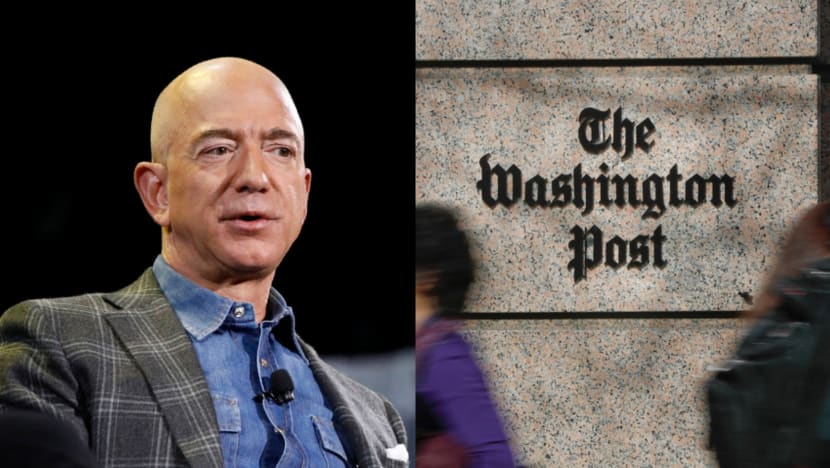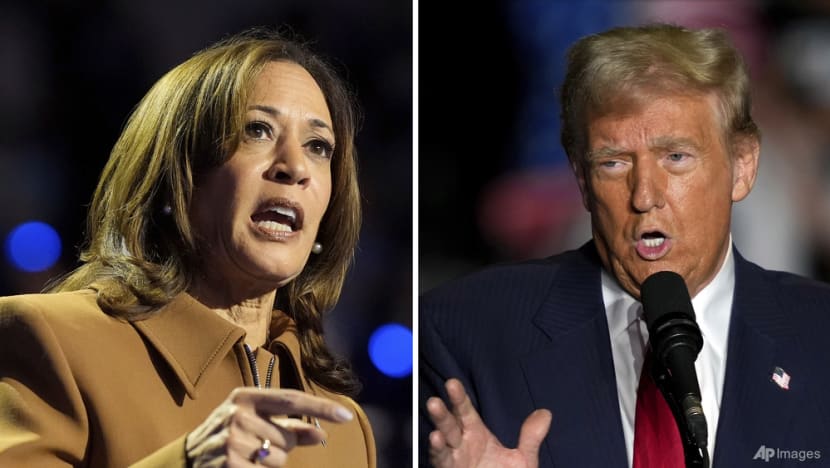Commentary: Why Washington Post’s decision not to endorse a US presidential candidate could be bad news
Seen from Asia, the backlash for Washington Post endorsing neither Kamala Harris nor Donald Trump in the presidential election may seem overblown. But owner Jeff Bezos’ decision raises deeper concerns, says RSIS’ Kevin Chen.

Composite photo of Amazon CEO Jeff Bezos (left) who is also the owner of The Washington Post. The major US newspaper recently broke with its tradition of endorsing a candidate for the US presidential election, which has triggered subscriber cancellations and editorial staff resignations. (Photos: AP/John Locher and Pablo Martinez Monsivais)

This audio is generated by an AI tool.
SINGAPORE: To observers in Asia, the backlash against major United States newspaper the Washington Post may seem overblown.
Following news last week that its owner, Jeff Bezos, blocked the paper’s endorsement of Vice President Kamala Harris in the upcoming presidential election, it lost over 250,000 digital subscribers, or 10 per cent of its subscriber base.
Three editorial board members and two columnists resigned their positions. The publication’s former editor Marty Baron called the decision "disturbing spinelessness" and "cowardice".
“Democracy dies in darkness,” reads the Washington Post’s official slogan. It is a bold but fitting warning that points to how it sees itself: As a lamp that illuminates shady dealings in America’s socio-political landscape, speaking truth unto power.
Many saw the decision not to issue an endorsement - historically, of the Democratic candidate - for the first time in decades as a betrayal of the courage the paper embodied in its reporting.
Democracy appeared to be dying in broad daylight, they said, amid speculation that Bezos did this out of fear of reprisal from Republican candidate and former president Donald Trump. If so, this raises deeper concerns for American media and society.
POLITICAL ENDORSEMENTS PART AND PARCEL OF AMERICAN MEDIA
This ruckus can seem strange, seen from Asia. With a handful of exceptions, such as the Jakarta Post’s endorsement of Joko Widodo for Indonesian president in 2014, news platforms here do not declare an explicit preference nor seek to influence the political choices of their readers.
Some may even see the Washington Post’s non-endorsement as a necessary step to calming the contentious American media environment.
But political endorsements have been part and parcel of American newspapers since the 1800s. They were an outgrowth of how these papers, and particularly their opinion sections, were seen as trusted voices and advocates for communities. Newspapers were the lens by which many Americans understood their surroundings, with a peak circulation of 63 million daily newspapers in the 1970s and 1980s.
While a relatively young paper, the Washington Post quickly rose to national prominence with its reportage of the Pentagon Papers in 1971.
Its real claim to fame was its coverage of the Watergate scandal, which uncovered a network of political spying and cover-ups that ultimately toppled then president Richard Nixon’s administration. Part of what made the Post trustworthy was their determination to follow through with a story despite threats and rumours of retaliation.
Even Bezos’ purchase of the paper in 2013 did not diminish this investigative spirit. Trump, angered by negative coverage during his presidency, reportedly intervened in defence contracts against Bezos’ businesses. Nonetheless, Washington Post journalists won Pulitzer Prizes for stories on the Trump Foundation’s claims of charitable giving and Russian interference in the 2016 election.
The Post’s storied history and reputation for courage under fire only made this decision to withhold their endorsement of Harris more perplexing.
POOR TIMING AT BEST, COWARDICE AT WORST
Granted, the world has changed since the 1970s. Amid falling newspaper readership, newspapers increasingly rely on rich owners to stay afloat.
Fewer newspapers are endorsing candidates, worried about chasing away their subscribers over perceptions of bias. In fact, Bezos argued this in a recent op-ed, supposedly seeking to “increase (the Post’s) credibility” by avoiding a “(biased)” endorsement.
Ironically, withholding a planned endorsement at this late stage speaks volumes more than an endorsement ever would.

First, there is the issue of consistency. Under Bezos’ ownership, the Post endorsed Hillary Clinton in 2016 and Joe Biden in 2020, and its opinion page continues to be outspoken about the dangers posed by a second Trump term. Bezos’ intervention does little to whitewash the coverage of his paper, and only raises questions about its editorial independence.
A second issue concerns the timing of this decision. Announcing this decision at such a late stage gives the impression that the Post is hedging its bets instead of taking a principled stand.
Making matters worse, Bezos’ aerospace company, Blue Origin, had a meeting with Trump’s campaign the same day that the decision was made. Bezos claims that there was “no quid pro quo” about the decision, but the timing of the events casts doubt on this assertion.
A third issue concerns the context. Across America, faith in traditional media has been falling precipitously. Even Democrats have begun to express suspicions about media platforms, such as the New York Times and CNN, for what they call a failure to hold Trump to the standard that Biden and Harris are held to, with career-ending scandals barely receiving mainstream coverage.
As political commentator Van Jones remarked on CNN, Trump “gets to be lawless, but (Harris) has to be flawless.”
On the eve of this critical election, Americans looked to platforms such as the Post for illumination. Yet they found poor timing at best, and cowardice at worst.
OBEDIENCE IN ANTICIPATION OF TRUMP 2.0?
Yet others have pointed to a more worrying outcome involving the guardrails against a second Trump administration, potentially a more radical one filled with enablers rather than technocrats willing to speak up against Trump.
During Trump’s first term, Bezos withstood pressure to block reporting, but he may not put up such resistance if Trump wins in November.
Observers have likened this situation to “anticipatory obedience,” a term coined by historian Timothy Snyder. In describing how authoritarians exert their control over people, Snyder noted that people often surrender their power preemptively, cowed by the fears of reprisals or by peer pressure.
If Bezos and Elon Musk, some of the richest people in America, are lining up with Trump, there are fears that more may be cowed into subservience if Trump wins.
For the moment, the Washington Post’s non-endorsement is playing out as a poorly timed business decision. But it may also become the opening move to a wide-ranging capitulation to Trump’s demands if he wins.
Kevin Chen is an Associate Research Fellow with the US Programme at the S Rajaratnam School of International Studies (RSIS), Nanyang Technological University (NTU), Singapore.


















